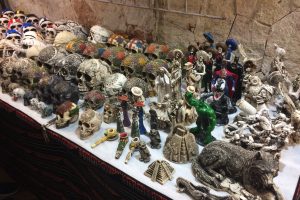
SECOND QUESTION
The State of Man after Death
The state of man after death is not a new state, only his condition in this life is made manifest more clearly in the next life. Whatever is the true condition of a person with respect to his beliefs and actions, righteous or otherwise, in this life, remains hidden inside him and its poison or its antidote affects his being covertly. In the life after death it will not be so; everything will manifest itself openly. One experiences a specimen of it in a dream. The prevailing condition of the body of the sleeper makes itself manifest in his dream. When he is heading towards high fever he is apt to see fire and flames in his dream, and if he is sickening due to influenza or a severe cold he is apt to find himself floating about in water. Thus, whatever the body is heading for becomes visible in a dream. So one can understand that the same is the way of God with regard to the afterlife. As a dream transmutes our spiritual condition into a physical form, the same will happen in the next life. Our actions and their consequences will be manifested physically in the next life, and whatever we carry hidden within us from this life will all be displayed openly on our countenances in the next life. As a person observes diverse types of manifestations in his dreams but is not conscious that they are only manifestations, and deems them as realities, the same will happen in the next life. Through such manifestations, God will display a new power, a power which is perfect, complete and absolute as He is All Powerful. If we were not to call the conditions of the next life manifestations and were to say that they would be a new creation by Divine power, that would be perfectly correct.
God has said that no virtuous one knows what bliss is kept hidden from him, as a reward for that which he used to do.1 Thus God has described all those bounties as hidden, the like of which is not to be found in this world. It is obvious that the bounties of this world are not hidden from us and we are familiar with milk, pomegranates and grapes etc. which we eat here. This shows that the bounties of the next life are something else and have nothing in common with the bounties of this life, except the name. He who conceives of the conditions of paradise in the terms of the conditions of this life has not the least understanding of the Holy Qur’an.
In interpreting the verse that we have just cited, our lord and master, the Holy Prophet(saw), has said that heaven and its bounties are such as no eye has seen, nor has any ear heard, nor have they been conceived by the mind of man; whereas we see the bounties of this world and hear of them and their thought also passes through our minds. Now when God and His Messenger describe them as something strange, we would depart altogether from the Holy Qur’an if we were to imagine that in heaven we shall be given the same milk which is obtained in this life from cows and buffaloes, as if herds of milch cattle would be kept in heaven and there will be numerous beehives in the trees of heaven from which angels will procure honey and pour it into streams. Have these concepts any relationship with the teaching that says that those bounties have never been witnessed in this world, and that they illumine the souls and foster our understanding of God and provide spiritual nourishment? They are described in physical terms but we are told that their source is the soul and its righteousness.
Let no one imagine that the verse of the Holy Qur’an cited below indicates that the dwellers of paradise, on observing these bounties, will recognise them that they had been bestowed these bounties a foretime also, as Allah, the Glorious has said to give glad tidings to those who believe and work perfect righteousness that they will inherit Gardens beneath which rivers flow. Whenever they are provided with fruits therefrom, which they will have already tasted in the life of the world, they will exclaim: ‘This is what we were given before’, because they will find that those fruits resemble the fruits which they have already tasted.2 It is not to be supposed from the wording of this verse that on beholding the bounties of paradise the dwellers of paradise will discover that they are the same bounties which had been bestowed upon them in their previous life. This would be a great mistake and would be contrary to the true meaning of the verse. What God Almighty has said here is that those who believe and work righteousness, build a paradise with their own hands, the trees of which are their faith and the streams of which are their righteous actions. In the hereafter also they will eat of the fruits of this paradise, only those fruits will be sweeter and more manifest. As they will have eaten those fruits spiritually in this world, they will recognise them in the other world and will exclaim: ‘These appear to be the same fruits that we have already eaten’; and they will find that those fruits resemble the fruits that they had eaten before in this world. This verse clearly proclaims that those people who were nurtured in this life on the love of God will be given the same nurture in physical shape in the hereafter. As they will have tasted the delight of love already in this life and would be aware of it, their souls would recall the time when they used to remember their True Beloved in corners, in solitude and in the darkness of night and used to experience its delight.
In short, there is no mention in this verse of material food. If it should strike anyone that as the righteous would have been given this spiritual nourishment in their life in this world it could not be said that it was a bounty that no one had seen or heard of in the world, nor had it been conceived by the mind of man; the answer would be that there is no contradiction here, as this verse does not mean that the dwellers of paradise would be bestowed the bounties of this world. Whatever they are bestowed by way of comprehension of the Divine are the bounties of the hereafter, a specimen of which is given to them in advance to stimulate their eagerness.
It should be remembered that a godly person does not belong to the world, that is why the world hates him. He belongs to heaven and is bestowed heavenly bounties. A man of the world is given worldly bounties, and a man of heaven is bestowed heavenly bounties. Thus it is true that those bounties are hidden from the ears and hearts and eyes of the worldly; but he whose worldly life suffers death and who is given a drink of the spiritual cup which he will drink in a physical form in the hereafter, will then recall having partaken of it in his previous life. It is true, however, that he will consider the eyes and ears of the world as unaware of it. As he was in the world, though he was not of the world, he will also testify that the bounties of heaven are not of the world and that he did not see such a bounty in the world nor did his ear hear of it, nor did his mind conceive it. He saw a specimen of those bounties of the hereafter which were not of this world. They were a presage of the world to come to which he was related and had no connection with the life of this world.
Three Qur’anic Insights Concerning the Hereafter
It should be kept in mind that the Holy Qur’an has set forth three insights with regard to the conditions of the life after death which we now proceed to expound.
First Insight
The Holy Qur’an has repeatedly affirmed that the life after death is not a new phenomenon and all its manifestations are reflections of this life. For instance, it is said that every person’s deeds have We fastened firmly to his neck; and on the Day of Judgement We shall make them manifest and shall place them before him in the form of a book which he will find wide open.3 In this verse the expression “bird” has been metaphorically employed for actions, because every action, good or bad, flies away like a bird as soon as it is performed and its labour or enjoyment comes to an end; only its heavy or light impress is left on the heart.
The Qur’an sets forth the principle that every human action leaves its hidden impress upon its author and attracts an appropriate Divine reaction which preserves the evil or the virtue of that action. Its impress is inscribed on the heart and face and eyes and ears and hands and feet of its performer. This is the hidden record which will become manifest in the hereafter.
Concerning the dwellers of heaven, it is said that on that day thou wilt see the light of the believing men and the believing women, which is hidden in this world, running before them and on their right hands manifestly.4
At another place addressing the wrongdoers it is said that the desire of increase in worldly possessions beguiles you till you reach the graves. Do not set your hearts upon the world. You will soon come to know the vanity of your pursuits; again, you will soon come to know how mistaken you are in pursuing the world. If you had possessed the certainty of knowledge you would surely see hell in this very life. But you will see it with the certainty of sight in your middle state (Barzakh), then you shall be called to account on the Day of Judgement and the torment will be imposed on you and you will know hell through your experience.5
Three Types of Knowledge
In these verses God Almighty has clearly set forth that for the wicked the life of hell begins in a covert way in this very world, and if they would reflect they would observe hell in this very life. Here God Almighty has indicated three types of knowledge, namely knowledge by certainty of reason, knowledge by certainty of sight, and knowledge by certainty of experience. This might be illustrated thus. When a person perceives smoke from a distance his mind conceives that smoke and fire are inseparable, and therefore where there is smoke there must be fire also. This would be knowledge by the certainty of reason. Then on a nearer approach he sees the flames of the fire and that is knowledge by the certainty of sight. Should he enter into the fire, that would be knowledge by the certainty of experience. In these verses God Almighty says that knowledge of the existence of hell as a certainty can be acquired in this life through reason, its knowledge through the certainty of sight will be acquired in Barzakh, the intermediate state between death and judgement, and on the Day of Judgement that knowledge would become a certainty by experience.
Continues in the next edition
Endnotes
1. And no soul knows what joy of the eyes is kept hidden for them, as a reward for their good works. (Ch.32:V.18)
2. And give glad tidings to those who believe and do good works, that for them are Garden beneath which flow streams. Whenever they are given a portion of fruit therefrom, they will say: ‘This is what was given us before,’ and gifts mutually resembling shall be brought to them. (Ch.2:V.26)
3. And every man’s works have We fastened to his neck, and on the Day of Resurrection We shall bring out for him a book which we will find wide open. (Ch.17:V.14)
4. And think of the day when you will see the believing men and the believing women, their light running before them and on their right hands. (Ch.57:V.13)
5. Mutual rivalry in seeking worldly increase diverts you from God. Till you reach the graves. Nay! You will soon come to know. Nay again! You will soon come to know. Nay! If you only knew with certain knowledge, You will surely see Hell in this very life. Aye, you will surely see it with the eye of certainty. Then, on that day you shall be called to account about the worldly favours. (Ch.102:Vs.2-9)




Add Comment